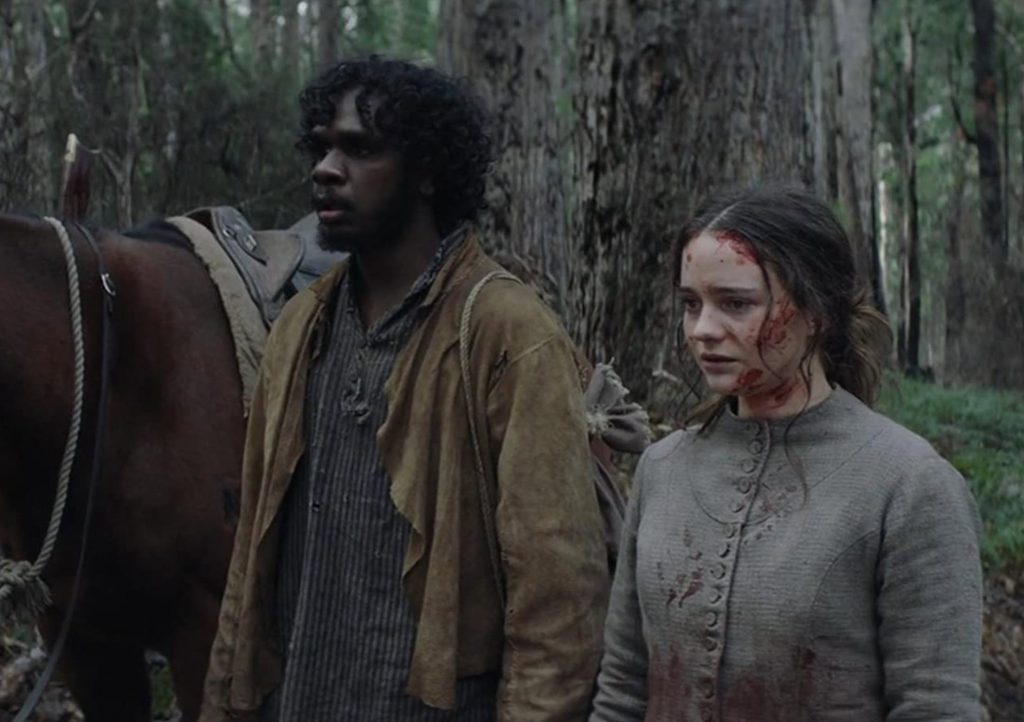“The Nightingale” (2018), directed by Jennifer Kent, is set in 1825 Tasmania. It follows Clare, a young Irish convict, who lives under the control of a psychopathic, violent British officer, Lieutenant Hawkins. As Clare and her husband plead for her freedom, Hawkins responds with rage and brutal violence by raping Clare one more time and killing her husband and baby. Filled with grief and anger, Clare is determined to get revenge and find Hawkins and the officer under him, who also raped her.
She asks Billy, an Aboriginal tracker, to help her find them. Billy and his community are also victims of British rule and its violence. He gets paid for his work, but he also mistrusts Clare, thinking she’s British. With time, they bond over being victims of the same oppressive system and shared trauma.
The film portrays colonial violence, misogyny, and racism. It is very explicit about the brutality enforced by the British rule and the resilience of those oppressed. “The Nightingale” is about the devastating consequences of violence, imperialism, and colonialism rather than vengeance.
In the end, Clare finally finds Hawkins in the main town, trying to impress the colonel in hopes of improving his position. Clare confronts Hawkins in front of all the officers and exposes his crimes by proving she got paid every time after being raped. She chooses not to kill him since humiliating him and, most likely, ruining his life felt enough. Clare returns to Billy, who has also been wounded and mistreated by Hawkins and the British. They go back into the forest and sit together contemplating everything that has happened. They share a quiet connection. Clare sees Billy dancing and singing like the birds in the sky. Clare thinks of this as a weird ritual, but the movie shows how Billy was connecting with his identity and the bond that humans and nature share.
In one last cry to engrave his identity and freedom, Billy paints his body and kills Hawkins and his henchman. He gets shot, but he resists. Clare and Billy go to the beach, and Billy performs his ceremony one last time, confirming his freedom and individuality from colonial impositions. The ending tells us that neither vengeance nor forgiveness will restore the grave damage that was committed. Clare’s decision to let Hawkins live is a turn away from the cycle of violence. At the same time, her bond with Billy challenges the idea of an endless hierarchical scheme in which white fellows can’t respect or engage with black fellows.

The Colonial Mindset and Its Repression
In the early 1800s, when European empires like the French, British, Portuguese, Spanish, German, and Dutch were exploring Africa to expand their territories, they formed specific arguments to justify colonialism. I wouldn’t be surprised if the same justifications they used to colonize Africa were used in Oceania.
For example, Dutch colonizers argued that Europeans arrived in Africa at the same time as Africans. They claimed that if the biblical Queen of Saba met Solomon and biblical prophets, then European Christians had arrived at the same time on the continent. German colonizers couldn’t believe Africans had built the big temples and sites they had found. They were convinced a lost European civilization had built them and then disappeared. European colonizers then held on to the idea that if Europeans had arrived in Africa at the same time as Africans, they too had the same rights over the land. Not only did they have the same rights, but because they considered themselves racially superior to Africans, they believed they had the right to hold a special status over the locals.
Although analysis on radioactive carbon dated that Mapungubwe arrived around the 12th century, 400 years earlier than the first European pioneers, European colonizers refused to believe it was true. Colonizers established and spread the idea that Africans were primitive and that Europeans were superior. They’re attitude was racist and filled with prejudice. However, this prejudice was necessary to justify their expansion and colonization. Racism goes beyond judging someone for the color of their skin; it’s a system needed to keep the oppressed at a disadvantage. What happened in British colonies in Africa is a representation of what happened in British colonies around the globe, including those in Oceania.
Philosophy
When we talk about philosophy, we talk about any human contemplating the world that surrounds them, which fills them with fundamental questions in their minds. Plato and Aristotle said astonishment is the beginning of philosophy. However, centuries later, many philosophers based on Reasoning and Logic, claimed that Africans couldn’t have a philosophy. They disregarded any other expression of self-contemplation and reflection about the world and the existence of humanity or nature that wasn’t based on Reasoning and Logic.
Whilst Reasoning and Logic are useful as they allow us to structure our thoughts and views into segments, it is not the only way in which humans have questioned themselves and their surroundings. The prejudice towards non-Western cultures for holding different ways of understanding the world as invalid, solely because they are not based on Reasoning and Logic, is invalid.
To quote popular philosophers:
· The Baron de Montesquieu said, “Black people have no soul.”
· D. Hume said, “I am inclined to suspect that blacks are by nature inferior to whites.”
· In “Observations on the Feeling of the Beautiful and Sublime”, Kant structures humans into different categories and hierarchies, placing them in this order: very blonde (Northern Europe), copper red (America), black (Senegambia), and olive yellow (Hindus). In his essay “On the Variety of Human Races”, he says: “Mr. Hume challenges anyone to cite a single example in which blacks have shown talent, asserting that among hundreds of thousands of blacks […] there has never been a single one who has shown anything great in science or art […] So fundamental is the difference between the two human races. And it seems to be as great in mental capacity as in color”.
· In “Lectures on the Philosophy of Universal History and Lectures on the Philosophy of Law”, Hegel describes African people with terms like barbarism, savagery, barbaric ferocity, animal man, anarchy, primitive, non-historical, undeveloped spirit, etc. He even justifies colonialism and conquests by claiming that, since Africans are incapable of rational and ethical behavior, they deserve to be colonized so Europeans can impose order and morality in their communities. He argues that Africans deserve to be enslaved as they will benefit from Western civilization and its model of reason, ethics, culture, etc.
· In a letter to Engels, Marx describes Lasalle as “This combination of Jew and German with the appearance of a black man […] His stubbornness is also black”.
European colonizers went to extremes by justifying the brutality of colonialism and imperialism as something natives from a foreign land would benefit from, as they lacked the European ideal model of thought, organization, and culture. The problem with this idea is that, although it sounds mad and is held by only a small group of people, it was indeed part of a system. In “The Nightingale”, we can see how the British were a minority, but they still managed to conquer and oppress the locals. The question is, how can a minority hold such power over a majority? Such a minority had deadlier weapons like rifles, but smallpox was also spread throughout Oceania, and locals lacked any immunity as they had never been exposed to it before.

Power Perpetuates Itself
Power is everywhere, and it forces its subjects to perpetuate power, even if they are also oppressed by it. In “The Nightingale”, as an Irish slave, Clare had no freedom under British rule. However, the only crack that allowed her to gain freedom and control over someone was within a pyramidal scheme that categorized any indigenous people under her. With her rifle, she was able to get through the forest using Billy as a tracker. Initially, Billy agreed to guide her because he needed money as he was poor, living under a tent, and had little access to food and shelter. Like other indigenous people, he was stripped of his land and the resources it provided. He didn’t fully choose to help Clare, but he was pushed into agreeing by a system that kept him at a disadvantage.
Moreover, after learning his adoptive father had been killed by Hawkins’s henchman, he agreed to help Clare get revenge, even if it meant he would get in trouble. In the end, Billy risks his safety to help Clare, but doing so means risking being killed by the British army. Power giving space to more power means Clare, a slave, can get her own slave, but it also means Billy, by defending himself from the oppressors, causes more violence and repression back from the oppressors to reinforce their control.
“The Nightingale” exposes how both gender and racial oppression build and shape the lives of the oppressed. The film questions whether we can get revenge as a way of healing, or do we get trapped in the cycles of violence. The biggest question the film raises is: Can we find freedom within an unfair, oppressive world? From my interpretation, Billy’s death was a way of creating his own space to find his freedom again. He gained his freedom to pass on his own terms and time. He resisted, injured, for hours before dying, and this is a representation of how much resistance he showed not just in his last moments, but for an entire lifetime. By dancing and connecting to the nightingales in the sky, he takes ownership of his identity and his story. He died under his own control by letting go of the pain and suffering. This is a powerful image that tells us resistance is important; it doesn’t matter how difficult it is to resist, when you do, you increase the chances of confirming where you come from and where those around you are headed.
In the end, Clare and Billy bonded not only because of shared trauma but because they both supported each other’s fight. Although Billy died, his resistance and fight were not in vain, but rather drove those who kept fighting, like Clare. Perhaps, due to Billy’s resilience and grip on defending his freedom, Clare will continue to fight instead of giving up. This is how resistance holds up through generations. Even though power is still oppressing and displacing vulnerable communities, the fight continues to live. If that resistance weren’t strong, it wouldn’t be alive 200 years after the British first arrived in Oceania. To this day, activists keep fighting for Tasmanian indigenous rights and recognition of indigenous heroes throughout history.
References
ABC News (Australia). (2022). Tasmanian Aboriginal resistance warriors still not recognised | ABC News. YouTube. https://www.youtube.com/watch?v=4e-5e2gpUXQ
Documentales-Online. (n.d.). África. La historia olvidada. Documentales-Online. https://www.documentales-online.com/africa-la-historia-olvidada/
Susaeta Montoya, Fernando. (2011). “Introducción a la filosofía africana. Un pensamiento desde el cogito de la supervivencia”. Ediciones Idea.



